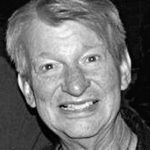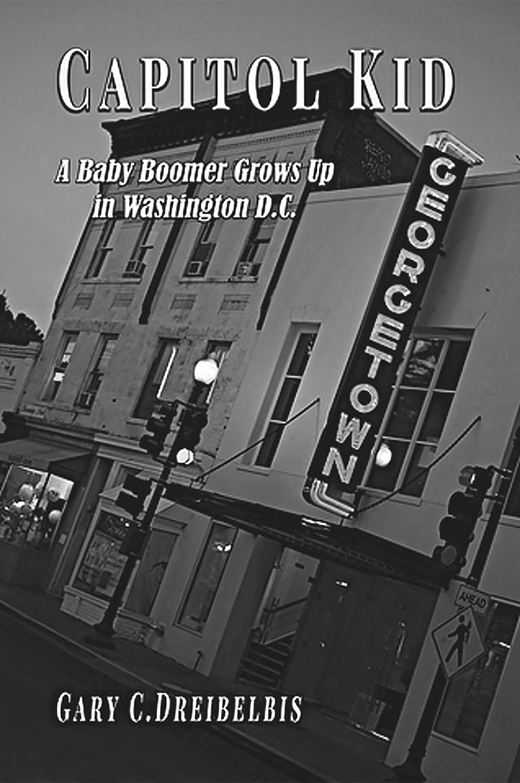Time can offer perspective – if you have the time.
When Gary Dreibelbis was Bradley University’s forensics director, he was on the road for 20 weekends a year – busy Friday afternoons and evenings, all day Saturdays, and getting back to Peoria at 2 or 3 on Sunday mornings – so he had little time for recollections or long writing projects. In his new book, “Capitol Kid: A Baby Boomer Grows Up In Washington, D.C.,” the 65 year old is making up for lost time, finding a new perspective to memories and even realizing connections between his childhood and his decade in Peoria.

Gary Dreibelbis
Dreibelbis wrote some at Bradley, he says, but he only had time for academic journal articles.
The inspiration for the new book was strange, he says.
“For about a week, I had these vivid dreams about growing up, and as an adult going back,” he says. “Pretty soon, I jotted down 24 topics, and it took about two months to draft it. A lot was good recall, but there was also research – and my recollections were mostly accurate.
“You don’t have to be from D.C. to enjoy the book,” he continues. “It’s universal, I think. I tried to offer something like Garrison Keillor or Jean Shepherd might’ve done.”
Indeed, as I wrote in an advance review, “More than a trip down Memory Lane, Gary Dreibelbis’ chronicle of growing up in Washington is a journey through shared memories to common roots. He revisits a time and place that seems both simple and complex, recalling JFK, fallout shelters, and a District of real neighborhoods and places as varied as classrooms, the Jefferson Memorial, Walt Disney. This terrific narrative is both personal and universal.”
ABC News correspondent Steve Osunsami (who grew up in Peoria) wrote, “What a beautiful story, that takes me back to the magic of a lost America, when kids still delivered newspapers, when television was young, and families always ate together. Reading this, I can smell the tang of root beer floats and hear the hum of those old black and white TVs – I can imagine the ink stains from the Post on Gary’s fingers. This is a precious story of an everyday American family in the nation’s capital, growing up in a time when current events would change them, and the country, forever. What Gary has written here is a wonderful love-letter to my birthplace, the District of Columbia.”
Dreibelbis himself says, “I grew up in Washington’s Anacostia neighborhood, which felt like a neighborhood, with restaurants, churches and theaters within walking distance. You didn’t need a car; it was like Brooklyn in D.C, with middle class neighbors who were government clerks, firefighters, teachers, cops.”
Remembering Peoria, Dreibelbis finds comparisons to his youth.
“There are similarities, especially the sense of a community of neighborhoods with different identities,” he says. “The West Bluff I loved, and Peoria Heights. Other areas had a distinct character, which a lot of places lack.”
His book even mentions Peoria, at least in passing.
Dreibelbis laughs and says, “Yeah, I point out that some cities have food associated with them: Philadelphia and cheesesteaks, New York and pizza slices, and Peoria and butterfly pork chop sandwich.”
There are other parallels between that time and now, but obvious differences, too.
“There’s an overall feeling of rapid change now, like those days,” he says. “But a big part of that now is social media, where people rant and rave and feel safe at their computer. We’ve lost our ability to be honest with each other.
“The big thing then was the Vietnam War, and the assassinations, so that’s different,” he adds. “There were riots after Martin Luther King was shot in 1968. The city was decimated; it was frightening. My dad had the car packed ready to ‘head for the hills.’ Then James Brown – the ‘Godfather of Soul,’ who’d had to cancel a concert there – went on TV and appealed for calm. Within two or three hours, the rioting stopped. The National Guard was amazed – they hadn’t realized what had happened and feared it was the calm before the storm. But he saved the city.
“It took about 30 years to recover, really.”
The book, illustrated with dozens of archival photos, recalls Dreibelbis crossing paths with the famous, from the Beatles to Washington Post sportswriter Shirley Povich.
“I was at the Washington Senators’ last ballgame before they moved to become the Texas Rangers,” he says. “We were beating the Yankees 7-5 with two outs in the ninth when fans spilled out onto the field at RFK Stadium, and the umpires forfeited the game to New York.
“In all the chaos, I went up to the press box, and there was Povich, typing his column on an Underwood typewriter. I just stood there in awe.”
But he relishes ordinary moments, too, from home and school to his first job and everyday life then.
“Most people don’t think of Washington as a town as much as a capital or government – not like New York or Chicago – or Peoria,” but in many ways growing up there offered experiences a lot of people had in different places.
“As kids, we used to play hide ‘n’ seek at Congressional Cemetery where historical figures such as Henry Clay, John C. Calhoun and J. Edgar Hoover were buried,” he adds. “Now, a cemetery worker told a friend that a frequent chore is removing pink, high-heeled shoes left at Hoover’s grave.”
(For years, gossip said the long-time FBI director was a cross-dresser, but that’s an urban legend.)
Now, Dreibelbis hopes to follow up “Capitol Kid.”
“I think the book will be a springboard to a new project, an oral history of D.C., like Studs Terkel, focusing on working-class people,” says Dreibelbis, acknowledging the luxury of time.
“I’ll take the time and look at past times there,” he says, “maybe offer another perspective.”
Released last month by Washington-based Neely Worldwide Publishing, “Capitol Kid” is available in hardback or paperback at bookstores and online.

